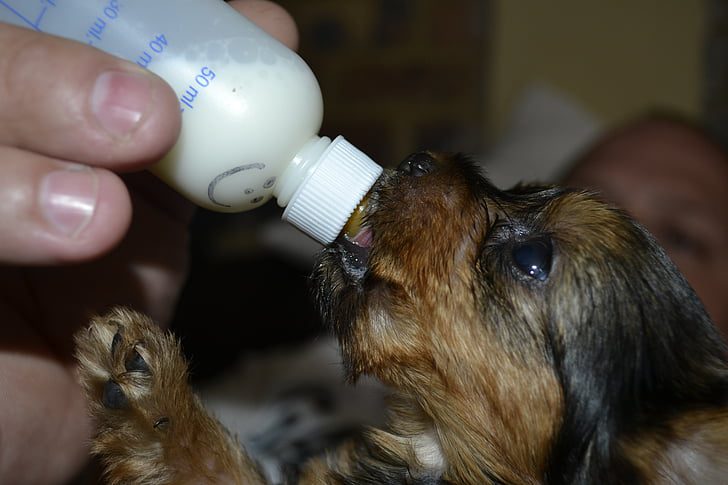If you’re a puppy owner, you know how important it is to provide your furry friend with a well-balanced and nutritious diet.
However, some puppies may have trouble digesting milk, which can cause discomfort and digestive issues.
Fortunately, there are several ways you can help your puppies who have trouble digesting milk.
In this article, we’ll explore some of the best strategies for improving your puppy’s digestion and overall health. Keep reading to learn more!
- Understanding Milk Digestion In Puppies
- How To Help Puppies Who Have Trouble Digesting Milk
- Switch to Lactose-Free or Milk Alternatives
- Gradually Introduce New Foods
- Add Probiotics to Your Puppy’s Diet
- Consult With Your Veterinarian
- Avoid Dairy Products
- Alternative Sources of Nutrition For Puppies
- Lactose-free Puppy Milk Replacers
- Commercially Available Options
- Benefits and Drawbacks
- Goat’s Milk
- Nutritional Content
- Lactose Levels Compared to Cow’s Milk
- Homemade Milk Replacer Recipes
- Ingredients
- Preparation and Feeding Guidelines
- How To Support a Puppy’s Digestive Health
- How To Prevent Milk Digestion Issues in Puppies
- In Conclusion
How To Help Puppies Who Have Trouble Digesting Milk
Understanding Milk Digestion In Puppies

Milk is often a staple of a puppy’s diet, but not all puppies can tolerate it. In fact, many puppies suffer from lactose intolerance, which is the inability to properly digest the lactose found in milk.
To understand how to help your furry friend, it’s important to understand the role of lactose in milk and the causes and symptoms of lactose intolerance.
Lactose is a type of sugar found in milk. It plays an essential role in providing the necessary nutrients for newborn puppies, but as they grow, their bodies produce less lactase, which is the enzyme required to break down lactose. This can lead to lactose intolerance.
The causes of lactose intolerance in puppies can vary, but it’s often the result of genetics. Certain breeds, such as the Chihuahua and Chinese Crested, are more likely to develop lactose intolerance than others.
Other factors that can contribute to lactose intolerance include weaning too early, gastrointestinal viral infections, and some medications.
The symptoms of lactose intolerance in puppies include diarrhea, vomiting, bloating, and abdominal pain. These symptoms can be uncomfortable for your puppy and can lead to more serious health issues if left untreated.
To help your puppy’s digestive system process milk, consider switching to lactose-free milk or a milk alternative like goat’s milk or coconut milk.
You can also add probiotics to your puppy’s diet to help balance their gut flora. It’s important to note that these changes should be made gradually to avoid further digestive upset.
See also: The Risks of Overfeeding Puppies
How To Help Puppies Who Have Trouble Digesting Milk

Switch to Lactose-Free or Milk Alternatives
If your puppy cannot tolerate the lactose found in milk, consider switching to lactose-free milk or a milk alternative like goat’s milk, almond milk, or coconut milk.
These alternatives are often easier for a puppy to digest and may help to prevent digestive upset.
Gradually Introduce New Foods
When introducing new foods to your puppy’s diet, it’s important to do so gradually to avoid causing digestive upset.
If you’re switching to a lactose-free or milk alternative, start by mixing it with your puppy’s regular food and gradually increase the amount over time.
Add Probiotics to Your Puppy’s Diet
Probiotics can help to improve your puppy’s digestive health by promoting the growth of beneficial bacteria in their gut.
You can add probiotics to your puppy’s diet by feeding them probiotic supplements or adding probiotic-rich foods like yogurt to their meals.
Consult With Your Veterinarian
If you’re concerned about your puppy’s digestive health or if their symptoms persist, it’s important to consult with your veterinarian.
Your veterinarian can advise you on the best course of action and develop a custom diet plan to support your puppy’s digestive health.
Avoid Dairy Products
If your puppy is lactose intolerant, it’s essential to avoid feeding them any dairy products, including cheese and ice cream.
These foods can cause digestive upset and may worsen your puppy’s symptoms.
Alternative Sources of Nutrition For Puppies
Puppies require a well-balanced and nutritious diet to ensure proper growth and development. While milk is often a staple of a puppy’s diet, not all puppies can tolerate it.
Luckily, there are alternative sources of nutrition that can provide the necessary nutrients for your furry friend. In this article, we’ll explore some of the best alternative sources of nutrition for puppies.
Lactose-free Puppy Milk Replacers
Lactose-free puppy milk replacers are a great option for puppies who cannot tolerate the lactose found in milk.
They contain all the necessary vitamins and minerals required for a healthy diet, without the discomfort and digestive issues caused by lactose intolerance. These replacers are available in most pet stores and are easy to find online.
Commercially Available Options
There are many commercially available dog foods, formulated specifically for puppies, that provide a well-balanced and nutritious diet.
These options are a great alternative to milk and provide all the necessary nutrients your puppy needs to grow and develop.
Benefits and Drawbacks
The benefits of lactose-free puppy milk replacers and commercially available options are that they provide a well-balanced and nutritious diet without the discomfort and digestive issues caused by lactose intolerance.
However, some puppies may be picky eaters and may not enjoy the taste of certain brands or types of food. It’s important to find a food your puppy enjoys, and that provides all the necessary nutrients.
Goat’s Milk
Goat’s milk is another alternative to cow’s milk that is easy for puppies to digest. It contains less lactose than cow’s milk, making it a great option for puppies with lactose intolerance.
Additionally, goat’s milk contains high levels of selenium and is a good source of niacin, vitamin B12, and vitamin A.
Nutritional Content
Goat’s milk is an excellent source of protein, fat, and essential vitamins and minerals.
It also contains lower levels of lactose than cow’s milk, making it an easier option for puppies who have trouble digesting milk.
Lactose Levels Compared to Cow’s Milk
Goat’s milk contains less lactose than cow’s milk, making it an easier option for puppies who cannot tolerate the lactose found in milk.
While goat’s milk is not completely lactose-free, it is an excellent option for puppies with lactose intolerance.
Homemade Milk Replacer Recipes
If you prefer to make your puppy’s food at home, there are many homemade milk replacer recipes available. These recipes often include ingredients like plain yogurt, egg yolks, and honey.
It’s important to note that homemade recipes should be prepared and fed under the guidance of a veterinarian to ensure they provide all the necessary nutrients for your puppy’s needs.
Ingredients
Ingredients in homemade milk replacer recipes can vary, but some common ingredients include plain yogurt, egg yolks, honey, and water.
It’s important to select ingredients that provide the necessary vitamins and nutrients to promote healthy growth and development.
Preparation and Feeding Guidelines
Homemade milk replacers should always be prepared under the guidance of a veterinarian to ensure proper nutrient content.
Additionally, it’s important to follow feeding guidelines to ensure your puppy receives all the necessary nutrients for proper growth and development.
See also: Helping Your Puppy Adjust To a New Feeding Routine
How To Help Puppies Who Have Trouble Digesting Milk
How To Support a Puppy’s Digestive Health
A puppy’s digestive health is an essential aspect of its overall health and well-being. Good digestive health can help prevent discomfort, digestive issues, and other health problems. Here are some tips on how to support your puppy’s digestive health:
Feed a Well-Balanced Diet
A high-quality and well-balanced diet is essential for good digestive health.
Make sure to select food formulated specifically for puppies and ensure it contains all the necessary nutrients required for their growth and development.
It’s also essential to select the right portion sizes and feed your puppy at regular intervals.
Switch to Lactose-Free or Milk Alternatives
If your puppy cannot tolerate the lactose found in milk, consider switching to a lactose-free milk or milk alternative like goat’s milk, almond milk, or coconut milk.
These alternatives are often easier for puppies to digest and may help to prevent digestive upset.
Add Fiber-Rich Foods to Your Puppy’s Diet
Fiber-rich foods are an essential part of a puppy’s diet and can help to improve their digestive health. Fiber can be found in fruits and vegetables like pumpkin, sweet potatoes, and carrots.
Encourage Hydration
Water is essential for good digestive health, ensuring the proper hydration of your puppy’s body.
Always make sure to have fresh water available to your puppy and encourage them to drink regularly to prevent dehydration and keep their digestive system functioning properly.
Consider Probiotics and Digestive Enzymes
Probiotics and digestive enzymes can help to improve your puppy’s digestive health by promoting the growth of beneficial bacteria in their gut and optimizing digestion.
Both can be added to your puppy’s diet to support their digestive system.
See also: How To Choose The Best Feeding Schedule For Your Puppy
How To Help Puppies Who Have Trouble Digesting Milk
How To Prevent Milk Digestion Issues in Puppies
Milk is often an essential part of a puppy’s diet, but not all puppies can tolerate it. Here are some tips on how to prevent milk digestion issues in puppies:
Be Aware of Lactose Sensitivity
Some puppies are lactose intolerant, which means they cannot tolerate the lactose sugar found in milk.
Be aware of your puppy’s lactose sensitivity and monitor their digestion after consuming milk to detect any signs of digestive issues.
Gradually Introduce Milk
If your puppy is not used to consuming milk, gradually introduce it into their diet by mixing small amounts of milk into their regular meal.
This will help your puppy’s digestive system to adjust to the milk gradually.
Choose Lactose-Free Milk Replacers
If you’re trying to avoid digestion issues, consider choosing lactose-free milk replacers formulated specifically for puppies.
These products contain all the necessary vitamins and minerals required for a healthy diet without causing any discomfort or inflammation.
Switch to Nutritious milk Alternatives
Another way to narrow the risk of digestion issues is switching to nutritious milk alternatives like goat milk. Unlike cow’s milk, goat milk has lower levels of lactose sugar, which makes it easier to digest.
It also contains more fat and protein than cow milk, which makes it an excellent source of nutrition for your puppy.
Know When to Consult Your Veterinarian
If your puppy experiences any digestive issues after consuming milk, or if you have concerns about their diet, consult with your veterinarian.
Your veterinarian can help you design a diet plan that meets your puppy’s dietary requirements and helps you avoid any digestion issues.
In Conclusion
In conclusion, it’s essential to be aware of your pup’s digestive system and adjust their diet accordingly.
If you notice that your puppy is struggling to digest milk, try switching to alternative options or adding supplements to their diet.
Always consult with your veterinarian if you have concerns about your puppy’s health or if their digestive issues persist.
With the right diet and care, you can help your puppy live a happy and healthy life.





Leave a Reply